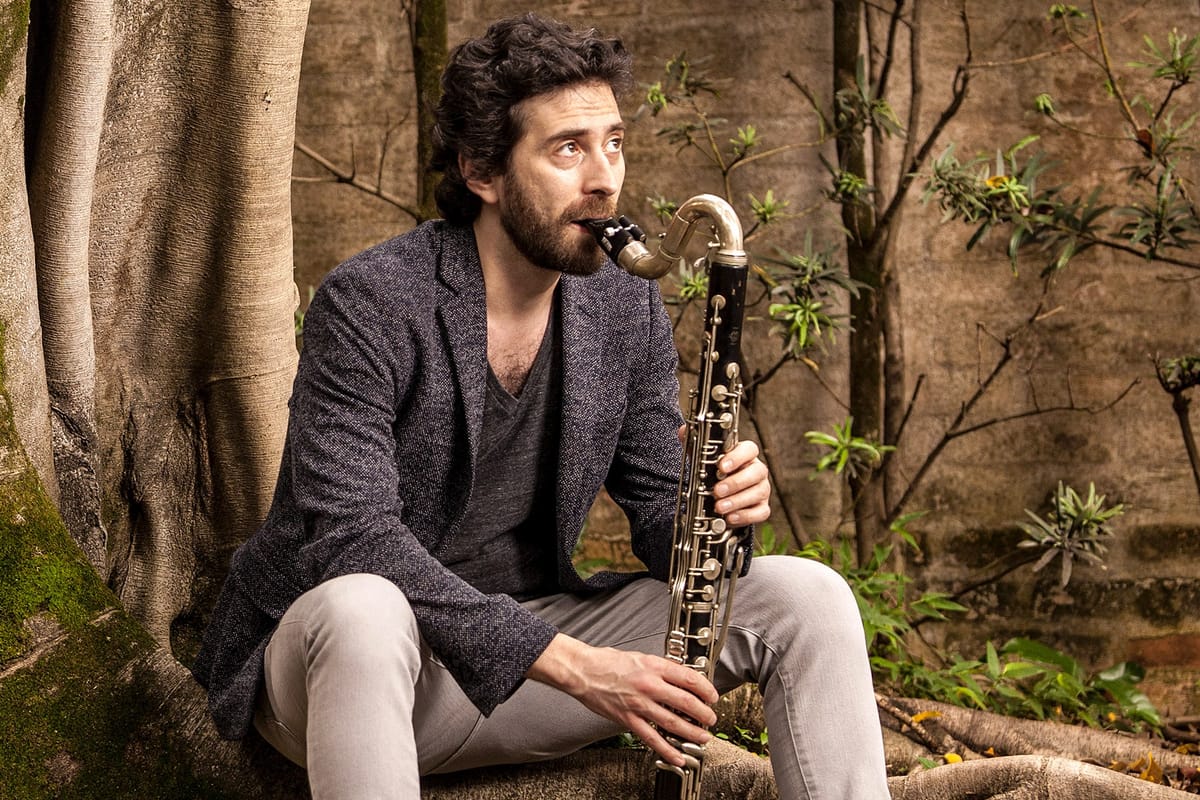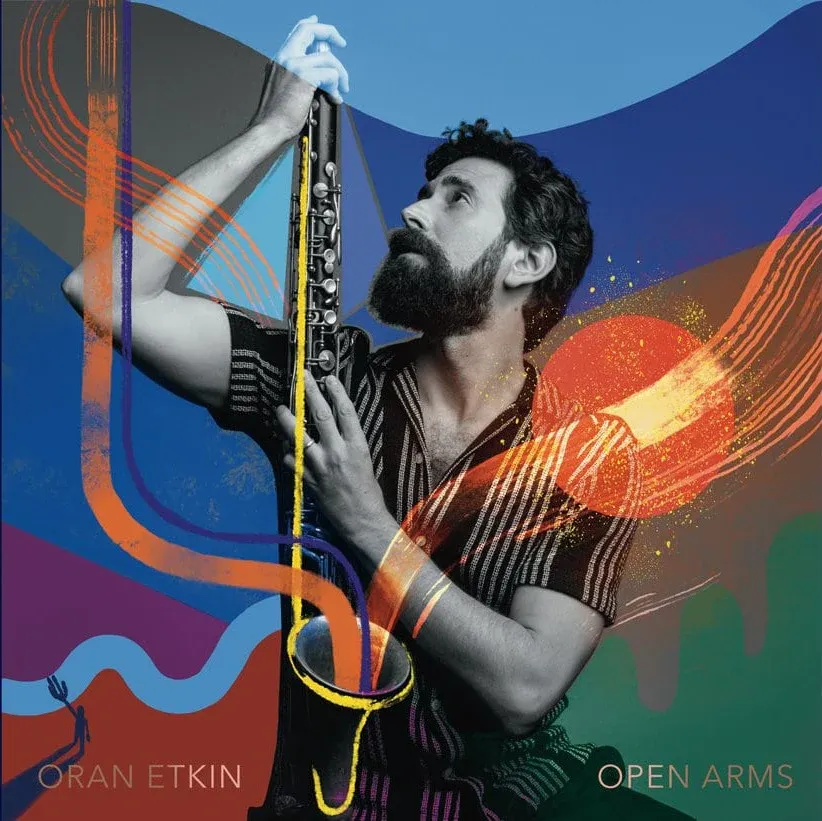Oran Etkin: bridging worlds with his album Open Arms

Given the multiculturalism and diversity that surrounds us, it is inexplicable to reduce existence to individualism. It is personal experiences that dictate the interpretation of musical language. The beauty of art is finding that the same melody can sound different if played in opposite contexts. Music: a place where you can find yourself while listening to others.

Listening to a record goes beyond discovering new rhythms; it is witnessing the artistic and spiritual connection of its creators. Under this symbiosis, some compositions can be analyzed from musical language as well as from cartography. Both can be tools for exploring and representing the space and place. While cartography focuses on the visual and geospatial representation of the earth and its features, music can evoke places and landscapes through sounds, rhythms, and melodies. In this context, the music of Oran Etkin meets these characteristics: 'I always try to make it clear that the composition is just a framework, and we can go anywhere. Also, I try to make the compositions with a lot of openness, not dictating every specific thing, so there's a lot of room for the musicians.'
Etkin's words resonate literally and musically, exemplified by his recent production, Open Arms. Through this album, he built profound connections with musicians across the globe. 'Well, for me, it was about having this attitude of openness. As I toured, everywhere I went, I tried to meet local musicians and open myself up to things happening.' Brazil, Zimbabwe, the US, Canada, the Czech Republic, and Turkey are the countries the listeners can explore while listening to it. 'So, in each case, it was a different process of how that happened. In Zimbabwe, I had two weeks off between some shows in France and Zimbabwe, so instead of just coming back home, I went and lived there for two weeks with these traditional families.' Music as a conduit to bridging the inherent distances between cultures; yet, this feat wouldn't be achievable without forging personal connections.
'I was lucky that I had a friend who's been going to Zimbabwe since the 90s, so she knew a lot of people there. She connected me with the Chigamba family, and the night after I got there, there was an all-night ceremony; it was a spiritual thing, so people were kind of getting possessed by the spirits during the ceremony, and throughout my stay, I was playing with them every day. So I just decided to provide them at my concerts, and we went to the studio and created six tracks.'
In Zimbabwe, Oran discovered a new facet as a musician: being a soldier of peace. 'These words of 85-year-old Zimbabwean Mbira master Tute Chigamba resonate with me because it's true that you can connect with people or create distance, and music is such an important tool to immediately strip away differences between people and connect. Like him, I believe that musicians are soldiers of peace, and creating is our role and mission.'
In the turbulent world we live in, where inexhaustible resources are destined for destruction, musicians play a significant role. 'I think creating together is something that this world needs right now. Also, this sense of connection is crucial because there are a lot of leaders against it, so it's easy to rule by dividing people. But actually, building connections and nurturing them is something that I feel we need in these times. So artistically, that's what we're doing, and I think it can help the world develop through these difficult times.' With Open Arms, Oran awaits those willing to listen and collaborate under the same vision: creating a positive impact.
Throughout ten songs, Open Arms positions itself as a meeting place where it is possible to discover rhythms and melodies that transcend a specific genre, even when the word jazz has been used to encompass them. 'I'm not particularly attached to that specific word. I studied with Yusef Lateef, one of the great masters of this music since the 60s, and hated the word jazz. You can't say that word. Yusef's word was Autophysiopsychic: music that comes from one's physical, mental, and spiritual self. The word you use doesn't matter, but I believe there is a kind of lineage and tradition that can open up to all kinds of influences around the world.'
The truth is that in this co-creation project, listeners will find traditional sounds where one of the central elements is improvisation connected and rooted in diverse cultures. 'For me, it's a creative process with somebody else. I mean, you can technically also improvise yourself, but I feel most alive with somebody else, so it's about connection and creating something new in the moment. Time is the canvas that we paint on, and when you're improvising, it's a very physical sensation. What makes it fascinating is that it happens in real-time, and you have to be 100% focused on that moment.' Just as time plays a central role when improvising, for Etkin, this creative act is comparable to meditation. The present is what matters—everything else falls away.
For Oran, the act of listening and being heard is fundamental. Under this context, it would be illogical to omit the audience, who is present in the last song, which is an alternative version of the first track É Doce Morrer No Mar. 'Every audience listens differently, you know, it's crazy. It's so hard to even know how that happens. There's some kind of energy. We just did a show in Prague, and they wanted to film it. So they asked us to do a set before the audience came because when all the audience was there, it was harder for them to move around. We played completely different from how we played once the audience was there; we played it so much deeper, you know? Most of the time I play, my eyes are closed, so it's not even just seeing the audience. There's some energy, and it's so hard to put into words how that energy is being transmitted.'
Open Arms is a journey in which sound elements emerge through personal, cultural, and social connections. Each song is a recognition of the musicians with whom he has built a language understandable to those who are willing to imagine a world without borders. It is also a response to the political decomposition and racism that persists in daily life. Perhaps, Oran Etkin's great success is in helping us form a deep connection with ourselves through his music; discover our inner selves as we would with songs: revealing sounds and phrases that have always been there, even when they seem imperceptible to us.